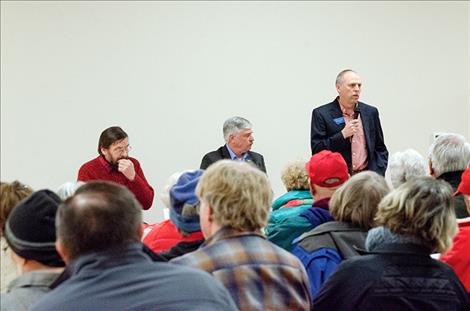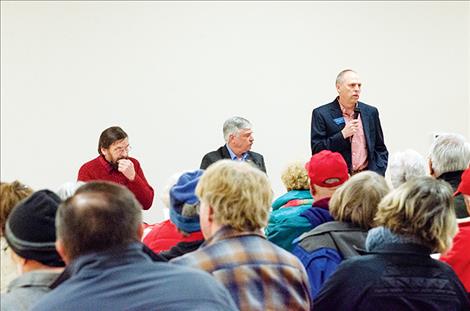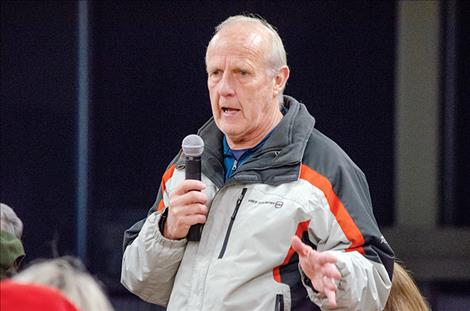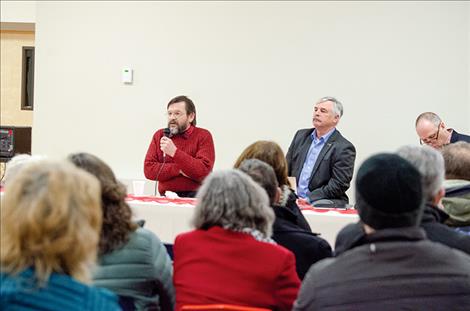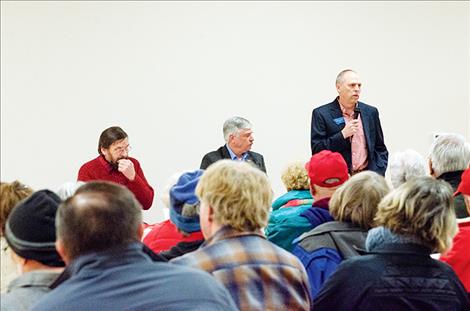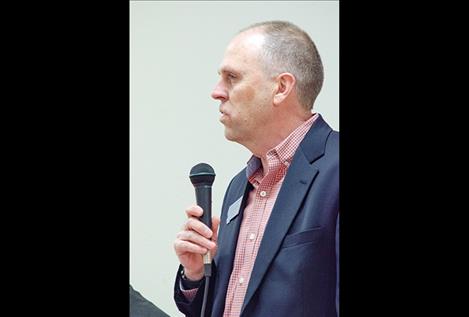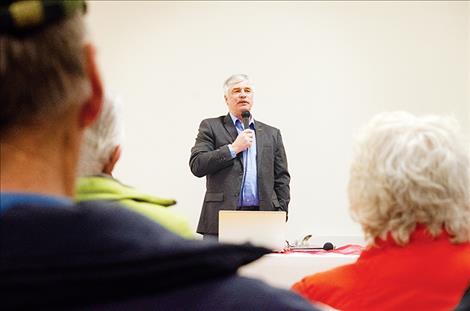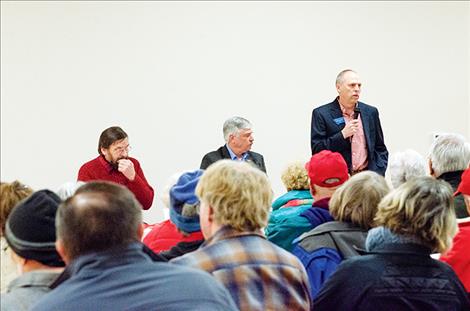Local representatives share update as state legislature hits halfway point
Hey savvy news reader! Thanks for choosing local.
You are now reading
1 of 3 free articles.
RONAN – Considering what could happen when people with differing political views gather together, the legislative update held in town on Tuesday, March 5, was mostly civil.
The event was hosted by Mission Valley Rises: Democracy Engaged (a community led group committed to protecting community rights), the Lake County Republican Central Committee and the Democratic Central Committee. The Pachyderm Club and the Northwest Counties Farm Bureau were also involved.
About 80 people filled the Boys and Girls Club to listen to an update concerning Montana’s 2019 legislative session as it hits the halfway point for the year from Senator Sen. Dan Salomon (R) SD47, Joe Read (R) HD 93 and Rep. Greg Hertz (R) HD12 and Speaker of the House.
The two-hour event was held at the Boys and Girls Club with director Aric Cooksley serving as the moderator. When the club opened in the new building, it was said that it would also be used as a venue for community events. Cooksley welcomed everyone and made note of the mixed political opinions in the room. “Thank you for being part of a political process that may not be perfect, but it represents us all,” he said.
Read took the microphone first. He said Montana’s general revenue is a big issue at the moment. “The one thing we are all in a battle for is how much general revenue we can save the state,” he said. Concerning the state budget, he said the Governor provides a “wish list” and the legislature goes to work to figure out how to make it happen.
“We had really good cooperation between the Democrats and the Republicans,” he said of the budget discussions. He said funding cuts were made, but none of the existing programs were “killed” and that the budget “is very tight.”
His personal accomplishment included introducing a resolution to support Montana’s right to sell coal. He said the issue is going onto the floor of the Senate. He hopes to speed up the export of coal.
“It was amazing how many people have an absolute distaste for coal in both the Senate and the House, who argue against it in any way shape or form,” he said. “There are people who are set, and there is no way you are going to change their minds. That makes the House floor an interesting place to have an argument.”
Salomon said he is working on the education committee. He is looking at a tuition freeze for higher education as well as technical education programs. “The education funding for K-12 is done,” he said of Montana public schools. “It’s signed. Now we don’t have to worry about that.” He said budget work would now move forward to Medicaid, preschool and infrastructure.
Hertz talked about wage increases for state employee pay plans. “We’ve been pushing really hard as Republicans to do a dollar amount. In the past, it was a percentage.” He explained that a percentage gives people in a higher earning bracket a much bigger raise than people in a lower bracket. An overall dollar amount would be a per-hour raise rather than the percentage.
The state budget was the next thing he talked about. He said the Governor proposed about $150 million in new taxes. “There was no appetite in the Republican-controlled legislature for any new taxes,” he said. He added that the budget discussions were going well. He said revenue was being saved by cutting empty jobs that hadn’t yet been filled.
Medicaid expansion is one of the next issues on the legislative agenda. Hertz said lawmakers need to agree on what the health insurance program will look like in the state, which could include a work requirement. “Another issue is figuring out how you pay for it,” he said.
One Medicaid funding option could be a tax paid by hospitals. “The hospitals have stepped up and said they would be willing to accept the tax, so it looks like that is coming through,” he said, “but that still leaves us short.”
Concerning infrastructure, Hertz would like to focus on water, sewer, roads and bridges before considering funding for new buildings. Public preschool across the state is also a big topic. Hertz said he talked to school administrators about the issue and decided that spending the money on current projects would be a better use of limited funding.
Members of the public took the next hour to ask questions. The first question was about the possible work requirement for Medicaid. One man said forcing people with physical or mental disabilities to work would be tragic. Hertz said the work requirement would be directed toward able-bodied people without disabilities.
One man’s objection to Medicaid expansion brought a clear response from Salomon. He said the people in the highest poverty rate need it, and if they don’t have it, they will go to the emergency room, and the state will end up paying anyway. “If we are going to pay for something, let's pay to get these people healthy and pay to get them some healthcare,” he said.
Climate change was a topic of discussion that created contention within the crowd. One woman explained climate change saying she understands that people think climate change couldn’t be happening because it’s cold outside and the ground is covered in snow, but she said weather was not the basis for climate change.
It’s about jet streams being unstable due to the overall temperature of the earth warming, she said. And the earth is warming due to pollution like coal. She called out Salomon and asked him about a Facebook post he made that makes fun of climate change activists with reference to a snowstorm.
Salomon responded by saying he has worked with meteorologists. “When you get them to talk off the record, they say the science of climate change is a polluted science because it’s a way to increase control over private enterprise,” he said.
The same audience member also addressed Read, saying he has been trying to “cement” climate change denial into the Montana Constitution, “luckily without success.” She said the real reason coal is unpopular is because it contributes to global warming.
Read said earlier that he doesn’t believe climate change is real. “You may fight me on my ideas about climate. I stand where I’m at, and I’m not going to change. I have true belief that what the federal government is telling us is not true about climate.”
Hertz finished up the climate topic by saying the State of Montana couldn’t do a lot about it. He said coal isn’t as popular anymore because other resources are cheaper.
The questions turned to House Bill 401. Hertz is carrying the resolution to repeal the law that allows for a five-year exemption from property tax while land purchased by a tribe is evaluated for trust status.
“They have a right to put it in trust and not pay taxes,” Hertz said of tribes. “The problem we have, once again, is the federal government. They are not doing their job. Why should it take five years to get a piece of property put into trust?” He said that an environmental assessment could take time but shouldn’t take years.
Lake County Commissioner Gale Decker stood up in the audience and said the commissioners are seeking a repeal of the five-year exemption. He said the fiscal analysis was flawed concerning the numbers that were put out when the bill was first passed. “The numbers were not even close to what they turned out to be,” he said. He continued to say that the predicted loss of revenue from the exemption would be about $15,000 statewide. “In reality, we’ve documented about $254,000 just in Lake County.”
Decker said the Bureau of Indian Affairs needs to fix the problem. “The tax payers, especially in Lake County, we are funding a problem that is actually between the BIA and CSKT and they need to fix the problem. It’s not up to Lake County taxpayers,” he said.
He continued, “People have said it’s an anti-Indian bill. It is not an anti-Indian bill. It is a fairness bill, and it was a bill that was hugely flawed in the numbers. It represented a significant tax shift to the other taxpayers in the county. In our opinion, CSKT should be paying the taxes on these properties until they get into trust.”
Decker said a second bill involving Lake County is also being brought to the legislature that concerns Aquatic Invasive Species. The bill would give the county the authority to create a taxing district, similar to a weed district, for the prevention of zebra and quagga mussel infestations in the county. “We are hopeful that our bill can pass because, as a county, we can direct the money where it needs to go better than the State of Montana. We feel we can do a better job, hopefully, in cooperation with CSKT and some of the other folks on the ground.”
Cooksley passed the microphone to a few more people in the audience before thanking everyone for attending and ending the meeting.















